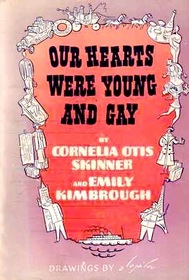Search -
Our Hearts Were Young and Gay
Our Hearts Were Young and Gay
Author:
"Cornelia Otis Skinner and Emily Kimbrough went abroad together. This was in the early twenties, and they were not quite in theirs. — "'Emily,' Cornelia said, 'attracts trouble the way blue serge attracts lint.' But it was, after all Cornelia who came down with measles and a great many complications. Emily did nearly drown a man, but her inten... more »
Author:
"Cornelia Otis Skinner and Emily Kimbrough went abroad together. This was in the early twenties, and they were not quite in theirs. — "'Emily,' Cornelia said, 'attracts trouble the way blue serge attracts lint.' But it was, after all Cornelia who came down with measles and a great many complications. Emily did nearly drown a man, but her inten... more »
ISBN: 214340
Publication Date: 1942
Pages: 247
Rating: 2
Publication Date: 1942
Pages: 247
Rating: 2
5 stars, based on 2 ratings
Genres:




